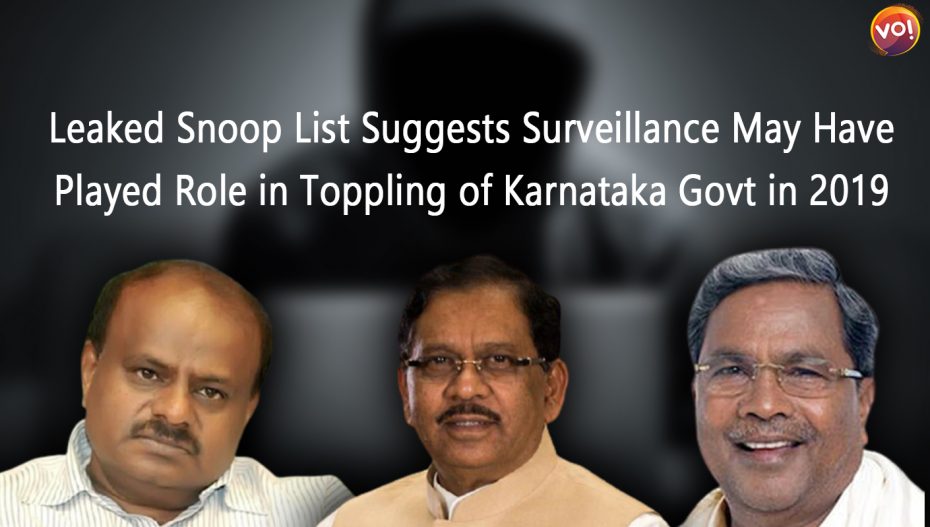New Delhi: In the run-up to the toppling of the opposition-run state government in Karnataka in July 2019, the phone numbers of deputy chief minister G. Parameshwara and the personal secretaries of chief minister H.D. Kumaraswamy and former chief minister Siddaramaiah were selected as possible targets for surveillance, according to The Wire’s review of records of numbers that were of interest to an Indian client of Israel’s NSO group.
The numbers form part of a leaked database accessed by the French media non-profit Forbidden Stories and shared with an international media consortium as part of what is called the Pegasus Project. NSO sells its Pegasus spyware – whose use involves the crime of hacking into a smartphone under Indian law – only to governments. Neither NSO nor the Modi government has denied that India is a customer.
The records indicate that the phone numbers of some of the key political players in Karnataka appear to have been selected around the time when an intense power struggle was taking place between the Bharatiya Janata Party and the Janata Dal (Secular)-Congress-led state government in 2019 after 17 ruling alliance’s legislators abruptly resigned to force a trust vote in the assembly.
This period also coincides with the selection of a new number Rahul Gandhi began to use after discarding an earlier one he had been operating, and which had been on the list of potential spyware targets since 2018.

In the absence of digital forensics, it is not possible to conclusively establish these Karnataka politics-related phones were infected or subjected to an attempted hack. However, the timing surrounding their selections as possible candidates for surveillance is crucial as, during the political power game that played out, the Congress and the JD(S) alleged that the BJP, actively backed by the Union government, was attempting to topple their coalition government by poaching their party legislators.
Although the BJP had denied these allegations, all rebels MLAs, who were subsequently disqualified by the Speaker, later joined the saffron party and were nominated as BJP candidates in the by-polls after the fall of the Kumaraswamy-led government.
The alleged horse-trading of legislators was quickly dubbed in the mainstream press as ‘Operation Lotus’ – a term first coined by opposition parties to hint at the ruling BJP’s allegedly frequent attempts to topple democratically-elected governments (BJP uses the lotus as its election symbol).
In its review of the leaked data, The Wire found that two phone numbers belonging to Satish, the personal secretary of then chief minister H.D. Kumaraswamy, were selected for potential targeting in mid-2019, at a time in which the Congress-JD(S) government was struggling to win back the rebels.
When The Wire reached out to him to inform about his presence on the leaked list, he refused to comment but confirmed that he was using the phone number in 2019.
The phone number of former Congress chief minister Siddaramaiah’s personal secretary Venkatesh was also added in the same period.
Sources close to Siddaramaiah said that the former Congress chief minister hasn’t been using a personal phone for many years, and relies on his aides for phone conversations. Therefore, the selection of Venkatesh’s phone number as a potential target for surveillance in this period assumes immense significance.
‘Strongly condemn such action’
Speaking to The Wire, Venkatesh, who has been associated with Siddaramaiah for over 27 years, confirmed that he was using the phone number which appears in the leaked records, and expressed consternation over his possible surveillance.
“I don’t know whether my phone was a target for snooping. All I can say is that I don’t do anything illegal. If what you are claiming is true, it is wrong and I strongly condemn such an action.”
However, he declined The Wire’s offer to get his phone, an Android, forensically examined, citing privacy concerns.
Curiously, a phone number of a policeman, Manjunath Muddegowda, whom The Wire confirmed as one of the security personnel of former Prime Minister and JD(S) president H.D. Devegowda, also appears in the leaked records. When contacted by The Wire, he confirmed his identity but refused to speak on the matter. His number was selected as a potential target in mid-2019.
On similar lines, sitting Congress deputy chief minister G. Parameshwara was also selected as a potential candidate during the middle of this political controversy.
When The Wire contacted him, he confirmed that he was using the selected phone number in 2019 but had since stopped using it for many months.
When asked why he thought his phone number may have been of interest, he said, “I have no idea about the spyware. But if at all my phone number was put under surveillance, as you are claiming it was, I do not know why it was done. I was not involved in any political management at the time. I wasn’t even the Pradesh Congress Committee president at the time.”
A game of high stakes
In mid-2019, the stakes were immensely high for all three political parties.
The post-poll alliance of the Congress and JD(S) forced the BJP to remain out of power, despite it finishing as the single-largest party in the 2018 state polls. Although the BJP had 105 MLAs in the 224-member assembly, the unlikely post-poll coalition distanced it from power. Despite the alliance, the Union government’s nominee and titular head of the state Vajubhai Vala gave BJP’s B.S. Yediyurappa the first shot at power. After he could not prove his majority, Kumaraswamy, with the support of Congress MLAs, formed the government.
Almost a year after he assumed charge as chief minister, Kumaraswamy became vulnerable again in the first two weeks of July 2019, when 13 Congress legislators and three JD(S) legislators abruptly tendered their resignations to the assembly speaker. These included high-profile MLAs like the Congress’s Ramesh Jarkiholi, Ramalinga Reddy and Anand Singh, and A.H. Vishwanath of the JD (S).
As it dawned upon Kumaraswamy, who was on a semi-private trip to the US, that his government may be hurtling towards a possible collapse, he immediately returned and attempted to reach out to the rebels, who by this time had lodged themselves at a Mumbai hotel.
By mid-July, some of the independent MLAs also withdrew support to the Kumaraswamy government. Following the first rounds of resignations, another three Congress legislators, including R. Roshan Baig, who was being probed by the CBI for his alleged role in the Rs 4,000 crore IMA Ponzi scheme, tendered his resignation, making it clear that the Kumaraswamy government did not have a majority in the assembly.
High drama ensued when Congress leader and current PCC president D.K. Shivakumar flew to Mumbai to mollify the rebel MLAs but wasn’t allowed entry into the hotel.
In a last-ditch effort, speaker K.R. Ramesh Kumar refused to accept many of the resignations, asserting that only five of them were “in order”. It was after this that 10 rebel MLAs, assisted by the former attorney-general Mukul Rohatgi, moved the Supreme Court to say that the speaker was deliberately delaying the acceptance of their resignations. In response, the Kumaraswamy government also moved the apex court, claiming that the parties had the right to issue a whip to their MLAs, which also included the rebels.
Supreme Court moved
Throughout this tumultuous political drama, the decisions of the Supreme Court bench headed by then Chief Justice of India Ranjan Gogoi helped the BJP in cornering the ruling alliance further. The apex court decreed that the rebels “ought not” to be compelled to take part in the trust vote and that the party whip didn’t apply to rebels, even as it allowed them to tender fresh resignations to the speaker under police protection. The Union is also considered to have played a role in assisting the rebels, as the former attorney-general Mukul Rohatgi represented them in their plea.
Meanwhile, BJP leader Yediyurappa moved a no-confidence motion against the government, while Kumaraswamy unsuccessfully attempted to hold the trust vote before the Supreme Court’s decision on the plea by rebels. Ultimately, the rebels remained unmoved. Kumaraswamy, having failed to prove a majority during the trust vote on July 23, resigned as the chief minister, paving the way for Yediyurappa to take over. The BJP leader was sworn in on July 26, 2019.
In the early days of July 2019, the ruling alliance claimed that it had managed to win back two rebels – M.T.B. Nagaraj and K. Sudhakar. Nagaraj, on the day, came on record to say that he would reconsider his resignation. However, curiously, both of them backtracked a day later and were found boarding a flight with Yediyurappa’s personal assistant Santosh and BJP MLA R. Ashok.
Although the BJP denied having any role in destabilising the Kumaraswamy government, Santosh was reportedly seen with the rebel MLAs at the Mumbai hotel.
Eventually, the Congress-JD(S) could bring on board only Ramalinga Reddy, while 17 others were disqualified by the speaker for violating the anti-defection law. Twelve of them were re-elected to the state assembly in the December 2019 by-polls and were given ministerial positions. Soon after their re-election, chief minister Yediyurappa told reporters, “They (disqualified MLAs) sacrificed for us. We’ve promised to make them ministers. There’s no question of going back on this promise.”
In a similar turn of events several months later, the elected Congress-led Madhya Pradesh government also fell in March 2020 after a number of their legislators resigned to eventually join the BJP. The pattern remained the same in both the states – resignations of rebel MLAs forcing a political crisis, their subsequent disqualification, a forced trust vote in the assembly leading to the fall of the government, the BJP forming a government with a reduced assembly strength, and eventual re-election of most rebels on BJP tickets.












